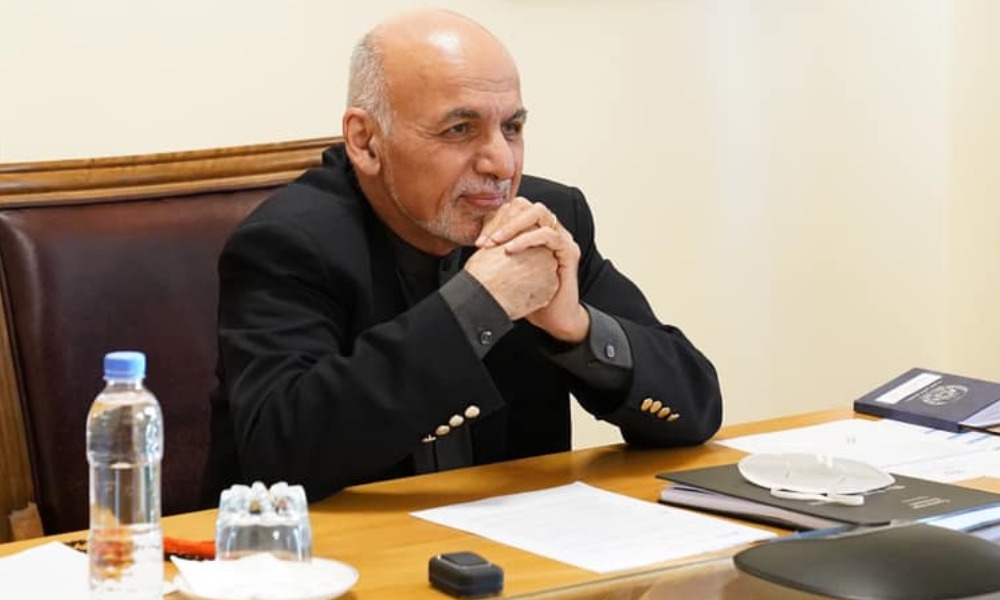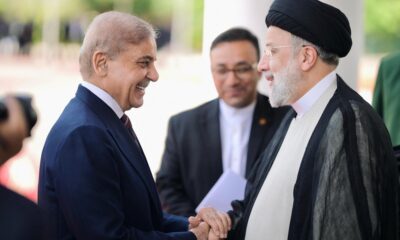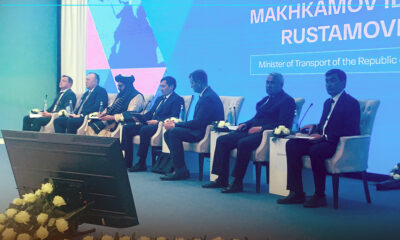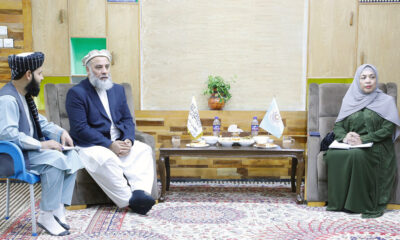Latest News
Ghani addresses special UN session on fight against COVID-19

Afghan President Ashraf Ghani on Thursday evening addressed the Special Session of the UN General Assembly in Response to the Coronavirus Disease COVID-19 Pandemic and said government moved quickly to contain the virus after the first case was reported in Herat in February.
“The COVID 19 pandemic came to Afghanistan at the end of February via Herat province, which shares a border with Iran.
“We moved quickly in anticipation that the virus would hit us hard. After analysis and consultation with diverse groups across Afghan society, we planned the response to the pandemic according to five phases of the crisis—acknowledgement, diffusion, adversity, relief and recovery,” Ghani said adding that the virus peaked in June.
He said that because of Afghanistan’s quick response, the country managed to maintain relatively low mortality rates. “We managed our response to not jeopardize livelihoods in the long-term or increase already high levels of poverty and food insecurity.”
He said Afghanistan had learned a number of lessons through this – firstly that “the vast scale of the disruptive and destructive effects of the COVID-19 pandemic is becoming clearer by the day.”
He said short-term impacts were seen almost immediately which included the loss of lives, the loss of jobs, and the downturn in the economy.
“But the medium to long-term impacts, we have not yet fully grasped. So, while we cope with the immediate impact, we need to look ahead and prepare for the long-term effects,” he said.
The second lesson learned was that the impact of the pandemic has been global and that while the response has been mostly national, “we have been unable, as an international community, to fully take advantage of the interconnected nature of our work to combat the disease.”
He pointed out that the world had an opportunity to respond to the pandemic with a level of unity and solidarity but instead countries experienced divisions.
He said a global focal point would have made the response more effective and coordinated, and global resources should have been mobilized on a larger scale.
The third lesson learned was that the pandemic has not been a leveler as expected; but instead, it has exacerbated existing gaps and inequalities across developed and developing nations.
“Countries in special situations have been especially hard hit. For example, we as a poor country, like many others around the globe, were not able to design and implement effective stimulus packages.
“We also had to be very careful in instituting lockdowns to avoid inflicting serious damage on our economy and peoples’ livelihoods, which could have inflicted more suffering than the virus itself,” he said.
Ghani also pointed out that this will continue even once a vaccine becomes available, because administering a vaccine requires capabilities and infrastructure that poor countries do not have.
“The role of multilateral organizations in the joint distribution of the vaccine will be critical. Our call for the vaccine to be a global public good must be loud and clear.” he said.
Ghani also said that Afghanistan is now facing its second wave and with little understanding of how cold weather will affect the nature of the pandemic.
He said he hopes that the international community will be able to draw from the lessons learned through this second wave and that a clear, phased approach needs to be designed and replicated nationally, regionally and globally.
He did say that the world is in a better position now to plan to ensure food security and basic human security in the face of subsequent waves.
“We must make sure that supply chains that were disrupted during the first wave are either restored or alternatives put in place to ensure basic needs are met.”
He also said the pandemic has transformed the way the world does business and the way everyone now lives.
“But it’s not all negative. COVID pushed the digitalization of the world at a speed that was inconceivable. And moving into subsequent waves of the pandemic, we need to embrace digital technology to further a global dialogue around policy, accessing and distributing the vaccine. To take advantage of these technologies, more must, however, be done to address the digital divide.”
“We will not be able to return to our pre-pandemic ways of communicating and governing. The pandemic opened up new possibilities for coordination and cooperation; for example, tele-medicine and distance learning. We need to embrace this change.”
Latest News
Iran, Pakistan leaders raise concerns over ‘terrorist groups’ in Afghanistan

Following a two-day official visit to Pakistan, Iranian President Ebrahim Raisi and Pakistan’s Prime Minister Shehbaz Sharif issued a joint statement emphasizing the need to further expand commercial and economic cooperation and transform the common border of the two countries from a “border of peace” to “border of prosperity”.
The two leaders also strongly condemned aggressions and crimes of Israel in Gaza, and demanded an immediate and unconditional ceasefire, as well as unimpeded humanitarian access to the besieged people of Gaza.
Numerous other issues were also discussed but on the topic of Afghanistan, they jointly declared their commitment to the development of Afghanistan as a peaceful, united, independent country free from the threats of terrorism and drug trafficking.
According to the statement the two countries pointed out that the existence of terrorist organizations in Afghanistan is a serious threat to the security of the region and the world.
The two sides stressed their desire to strengthen cooperation in the field of fighting terrorism and ensuring security and creating a united front against terrorism.
They also discussed the importance of coordinating regional and international efforts to ensure security and stability in the region.
“While respecting the sovereignty and territorial integrity of Afghanistan, the two sides recognized that increasing participation of all strata of Afghans in basic decision-making will lead to the strengthening of peace and stability in this country,” the statement read.
Latest News
Over 1,000 Afghan refugees forced out of Pakistan in one day

The Ministry of Refugees and Repatriations (MoRR) says over 1,000 Afghan migrants were forcibly returned from Pakistan on Tuesday through Spin Boldak border crossing in Kandahar province, the ministry said in a statement.
The ministry stated that based on information provided by the Spin Boldak Kandahar border command, these returnees comprised 191 families, totalling 998 people.
In addition, three migrants released from Pakistani prisons were also returned, according to the statement.
The statement added that after registering the returnees, the refugees were referred to the offices of the International Organization for Migration (IOM), the World Food Program (WFP) and the United Nations High Commissioner for Refugees (UNHCR).
Each family received 10,000 afghanis – paid to them by the Islamic Emirate.
In another statement, the ministry said that 2,783 migrants living in Iran voluntarily and forcibly returned to the country during this week.
Latest News
Afghanistan’s minister of transport and aviation attends regional meeting in Uzbekistan

Hamidullah Akhundzadeh, acting Minister of Transport and Aviation, headed a delegation to Uzbekistan for a ‘Six-Party Corridor’ meeting that included representatives from Afghanistan, Russia, Belarus, Pakistan, Kazakhstan and Uzbekistan.
On the sidelines of this meeting the Afghanistan delegation discussed trade through the corridor with the other five relevant countries.
According to the ministry of transport and aviation, Akhundzadeh met with the deputy ministers of transport of Russia and Belarus.
He also discussed ways to expand transit between Afghanistan and Russia; and Afghanistan and Belarus, and provide the necessary facilities to achieve this.
The ministry added that the acting minister had a bilateral meeting with the Minister of Transport and the Special Representative of the President of Uzbekistan on Afghanistan and discussed the expansion of road transport between the two countries.
-

 Sport5 days ago
Sport5 days agoAfghanistan Champions League kicks off with grand opening ceremony
-

 Regional5 days ago
Regional5 days agoIran’s foreign minister downplays drone attack, says Tehran investigating
-

 Latest News4 days ago
Latest News4 days agoPakistan’s frontiers minister stresses ‘dignified’ return of Afghan refugees
-

 Business5 days ago
Business5 days agoAfghanistan’s economic prospects are bleak: World Bank
-

 Latest News5 days ago
Latest News5 days agoMore than 800 Afghan refugees deported from Pakistan in two days
-

 Regional3 days ago
Regional3 days agoIranian president lands in Pakistan for three-day visit to mend ties
-

 Climate Change4 days ago
Climate Change4 days agoMassive river flooding expected in China, threatening millions
-

 Latest News4 days ago
Latest News4 days agoChinese keen to invest in Panjshir-Kabul water conduit project
























